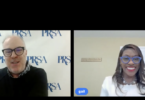One of the best things about teaching at The City College of New York is overseeing internships for advertising and public relations students.
At their frequent best, internships benefit both students and their sponsors. They provide students with invaluable experience bridging the gap between academia and the real world. Students apply what they’ve learned to the public relations business and are exposed to workplace demands, deadlines, expectations and culture. They learn how to adapt to the workplace and its politics. Best of all, successful interns often are hired upon graduation.
For sponsoring organizations, internships help identify new talent and provide additional support for tasks often delegated to entry-level professionals. Interns also bring fresh perspectives and unique talents — and not just in social media.
With the job market tougher than ever, internships are a must: For students, to show they are serious; and for businesses, to get help when everyone is under the gun to do more — much more — with less.
But there’s a catch: Most organizations don’t pay interns. In fact, most sponsors require students to receive academic credit for the internship, and they ask for the documentation to prove it, especially during Fall and Spring semesters. The exception is the agency-run, full-time paid Summer programs, which are few and highly competitive.
The bottom line: Students likely will pay thousands of dollars for the privilege of working for free. This is an even greater burden for those who must work to pay for all or part of their education and cut back their regular work hours to gain relevant career experience.
Now federal and state labor departments are watching organizations closely and drawing strict guidelines on intern use, to ensure that labor abuses are not occurring.
A timely New York Times article from Apr. 3, 2010, “Growth of Unpaid Internships May Be Illegal, Officials Say,” exposes the widespread abuse of student interns by a number of businesses, which are under investigation by the federal Department of Labor.
The Times quotes Nancy J. Leppink, acting director of the DOL’s Wage and Hour Division, who says, “If you’re a for-profit employer or you want to pursue an internship with a for-profit employer, there aren’t going to be many circumstances where you can have an internship and not be paid, and still be in compliance with the law.”
The article lays out the six criteria under which employers do not have to pay interns, among them:
- The internship must be similar to the training in an academic institution;
- The intern may not displace regular paid workers, and
- The employer derives no immediate advantage from the intern’s activities — in other words, it’s largely a benevolent contribution to the intern.
In my ten years’ experience supervising advertising and public relations internships, I’ve known almost all academic year (Fall and Spring semester) placements to have been unpaid. Fortunately, most appeared to have met the criteria; the possible exception being those in apparel companies, where students often spend their time packing samples for shipment to fashion editors and photo shoots and doing little else.
Public relations agencies and departments must do their part to make internships beneficial for the students, while making them advantageous and legal for the company. Here are my top five ways to manage an internship program successfully:
- At the time of application, provide a written description of the internship, including the skills required and nature of the work.
- Assign a supervisor (not in human resources) to oversee the intern on a regular basis.
- Once interns have fulfilled their assigned responsibilities, allow them to interview staff (within reason), to either expand on the knowledge gained in their assigned area or to learn about new areas.
- Definitely don’t wait until the end of an internship to offer feedback. Give constructive comments after the first month (preferably in person) and discuss with the intern what he or she would like to do to benefit from the experience. Note to interns: Have your list ready!
- If you can’t pay a salary, consider covering commuting costs or picking up lunch in appreciation for the work the interns do.
Most students genuinely want to learn and contribute during their internships. Given the stressful reality of today’s workplace, it’s all too easy to treat an intern as another pair of hands to get things done. But your expertise, attention and support go a long way toward making an internship a win-win for everyone — especially if you’re not paying.
Lynn Appelbaum, APR, Fellow, PRSA, is a PRSA National Board Member and the Advertising & Public Relations Program Director at The City College of New York.







I appreciate your suggestions directed to those managers responsible for interns that are not compensated but can otherwise be rewarded in other ways.
That said, I wholly disagree with your statement: “Most organizations don’t pay interns.” Unless you have statistics to back that up, my 15 years of experience tells me that most internships are, in fact, paid. Not all, and not all that well, but most. As a former communications professor and current PR manager, I firmly believe that unpaid internships, no matter the perceived opportunity, amount to slave labor. I am fortunate enough to work for a company that pays interns well, including those that work in my department. They work hard and earn every dollar. Former students would often ask me whether they should consider an unpaid spot at an agency or where ever, and my advise to them was always: “Were the office walls lined with rich mahogany and brushed metal? Was the parking lot full of luxury sedans and SUVs? If so, then they can absolutely afford you. They just don’t value you.”
The U.S. Department of Labor is cracking down on the practice of unpaid internships, not just within the PR industry but across all sectors of business, for- and non-profit. Frankly, it’s about time. Sure, this runs the risk of of many shops choosing to cancel their internship programs and off-loading said duties to lower-level staff. But when that blows up in their face — and it will — businesses that don’t pay interns will finally realize just how valuable they are once and for all and start hiring for pay.
Lastly, there is something to be said about idle hands and wanting to work at an firm or PR department when no paid options are available. I get that. Then again, I get bills, too. With all due respect to McDonald’s, were I a recent grad I’d rather flip burgers and keep gas in my jalopy than indenture myself for free. Plus, it would give me that much more time to network and pound pavement.
Your five guidelines provide an excellent model for structuring an internship. Not every organization can afford to pay interns but most any organization, following your suggestions, can contribute in a very real way to what students learn. Ben Franklin once said “An Investment in knowledge pays the best interest,” and I think that he was right. Organizations that invest time and/or money in helping students learn by providing good internship experiences benefit both students and our profession.
As a student who has not yet experienced an internship, your post has offered me with very helpful information. After reading, I have a better understanding of what I will be expected to do as an intern in the future, and what I should expect from the organization I will work with. Thank you.
Any company or organization who believes they cannot afford to pay an intern at least $10/hour should not hire interns, period. They either do not have the financial stability to be a proper model to young people, or they have their priorities really screwed up, and no young person should work for a company like that.
A company can always elect to hire part-time interns, if it is a budget concern. A nonprofit can use volunteers (but don’t call it an internship) if necessary, but be prepared to reward them in other ways.
It is this simple: Interns add VALUE. If you read all the criteria, it is difficult to offer an internship in PR that does not benefit your company. And if it does, and you do not pay, you are breaking the law.
Lynn, you are in a unique position to exert influence on these companies and organizations and demonstrate to them why your student interns should be paid, and I hope you take advantage of that, for your students’ sake. When people like you start insisting on compliance, that’s when it’s going to happen.
My own PR internships in DC and NY were paid. My small firm — TWO people, including me — TINY accounts. And I paid my interns. I paid the ones who got college credit the same as the ones who didn’t. I also picked up the tab on professional development workshops for them. Each intern had their own desk and business cards. They did real work, and it was the RIGHT thing to do.
I feel absolutely fantastic helping launch these talents into their careers; not paying them for their contribution to my company was never even a consideration for me.
As a college student, the
issue of unpaid internships is very important to me. From personal experience,
it seems most internships (at least PR, advertising or marketing) are unpaid. I
have had three internships thus far, all unpaid. Don’t get me wrong, I learned
many skills and gained valuable insight, but saw no money. I think you really
put this situation in perspective when you wrote “students likely will pay
thousands of dollars for the privilege of working for free.” This statement
embodies why I believe unpaid internships are, for lack of a better word,
unfair for students.
I really
appreciated your comments on public relations agencies need to make internships
beneficial for students. As a student, if I am not going to get paid for my
work, I want to have more flexibility allowing me to get the most out of the
internship. The sympathetic nature of your blog post was refreshing. Intern’s
free labor and the true purpose of an internship (to learn more about the
field) are often overlooked. As your post and other comments have noted,
interns add value. Idealistically that value would have a monetary
compensation. But, if that isn’t a possibility it is important for agencies and
other organizations to understand that their interns need to be benefitted.
Personally
I believe unpaid internships have put students in a hard situation. Many
students are forced to work side jobs on top of unpaid internships and school.
This puts a tremendous amount of pressure and stress on students. Ultimately, I
understand not all companies can afford to pay their interns. If all unpaid
internships were abolished the amount of internships available could
significantly decrease, harming students. I believe if companies can afford to
pay interns, they should. If they cannot afford to pay interns, they should
ensure the internship experience is very beneficial for students.